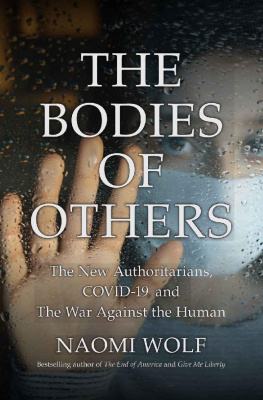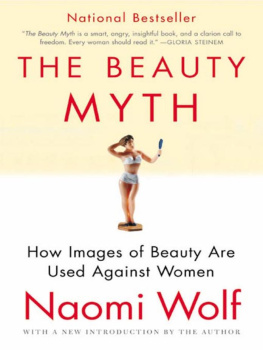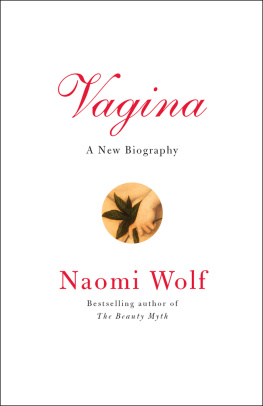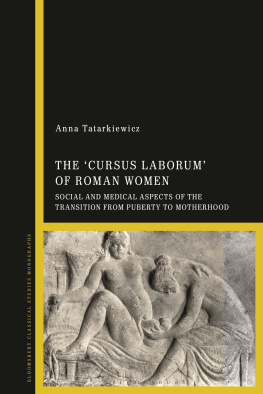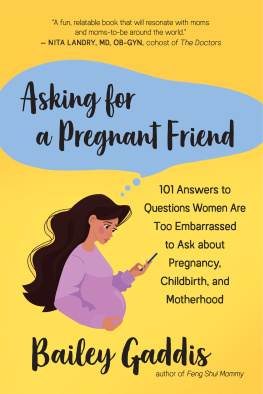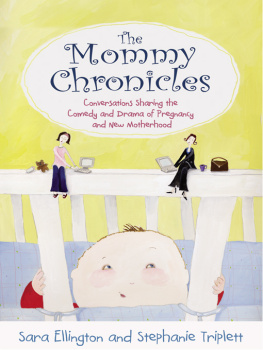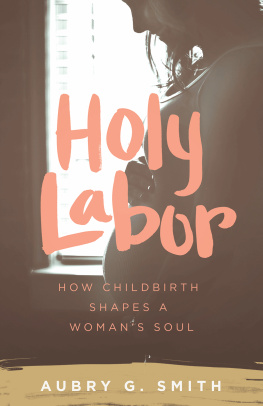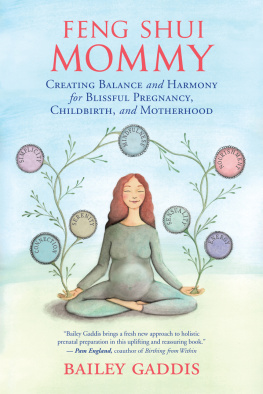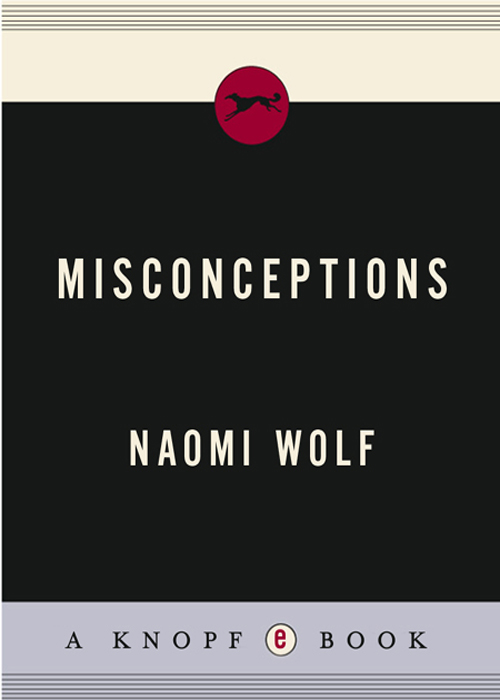
(misconceptions)
TRUTH, LIES,
AND THE UNEXPECTED
ON THE JOURNEY TO MOTHERHOOD
Naomi Wolf
DOUBLEDAY
New York London Toronto Sydney Auckland
Contents
For my mother
and my daughter
Introduction
Being pregnant and giving birth are like crossing a narrow bridge. People can accompany you to the bridge. They can greet you on the other side. But you walk that bridge alone.
AFRICAN PROVERB
The first time you give birth, the medical establishment calls you a primigravida. Primigravida is the Latin medical term for a woman in her first pregnancy.
Every year, hundreds of thousands of American women cross that bridge for the first time. Every year, the same number of women find themselves in a paradox: during the time a woman is in the grip of one of the most primal, joyful, lonely, sensual, psychologically challenging, and physically painful experiences she can face, she is often overwhelmed by messages that infantilize who she is supposed to be, and mystify what is happening to her.
This book will explore the hidden truths behind giving birth in America today. By looking at how a number of women, including myself, experienced the journey to first-time motherhoodand by examining what lies behind the standard landmarks along the pathI intend to show how the experience of becoming a mother, as miraculous and fulfilling as it is, is also undersupported, sentimentalized, and even manipulated at womens expense.
So many of us face the journey filled with misconceptions. Many women I heard from began their birth stories with the phrase I wish someone had told me. I wish someone had told me how unbelievably bloody and violent it would be, said one new mother. I wish someone could have let me know I would lose my self in the process of becoming a motherand that I would need to mourn that self, said another.
Still others remarked:
I had no idea my emotions would be so extreme during pregnancy.
I wish I could have been prepared for the fact that nothing happened the way I had hoped in the hospital.
I wish I could have been better prepared for the pain.
Women pregnant for the first time often said to me, I feel something is being kept from me, and that is the scariest part. The fact is, they are right. Indeed, as I discovered long after having given birth for the first time myself, quite a lot of important information is too often concealed from pregnant women.
Not only are we inadequately informed about what pregnancy, birth, and new motherhood really involve, we also lack freedom to describe what we have seen for ourselves along the way. The culture often insists on our keeping the full range of our feelings and discoveries a secret.
Some of the last secrets kept in this tell-all culture are secrets about the white-knuckle struggle, as well as the triumph, involved in this passage. What are the secrets that new mothers whisper? I have never felt so alone in my life, one new mother confided, a generous woman with plenty of friends and family support. I feel that there is this intruder in the house who is never going to go away.
Two weeks on, I wondered when I would bond with her, one frightened new mother admitted. No one prepared me for the fact that I would be on a forced march of exhaustion for months. I wish I had known that it would take a while to bond with her, and that it would be okay.
I wish someone had talked about what having a baby can do to your sex life.
Nothing else matters to me as much as the baby now, but I feel I just cant say that to friends who are working.
I feel as if I am not allowed to say to my friends or family that sometimes you just cant feel like nothing else matters as much as the baby.
Nothing I ever felt for anyone compares with this; I am besottedlike an addict. I stare at her for hours. My relationship with my husband is just an afterthought, you know, a runner-up, said another woman, who is devoted to her husband.
When she nurses I sometimes just want to scream, said a woman who has a patient temperament.
Giving birth and becoming a new mother demand great reserves of strength. But all too often, women are offered sugar-coated niceties to guide them on the journey, misleading information, half-truths, and platitudes. Books, classes, and videos available to mothers-to-be, I discovered, frequently have hidden agendas. Many of them omit aspects of the birth experience, or withhold information to advance their cause, to womens detriment. Little that women are exposed to in pregnancy adequately prepares them for the first three trimeters and delivery, or offers them a grounding in the gut-wrenching changes of what has been called the fourth trimesterthe sometimes savagely difficult adjustment period that follows birth.
Todays pregnancy bible, What to Expect When Youre Expecting, a book that is the intellectual equivalent, in my opinion, of an epidural, disapprovingly notes that women who have gone through the birth experience tell other pregnant women horror stories. To my mind, what is most distressing is not the prospect of a woman hearing about some of the tougher aspects of labor and delivery honestly told, but rather the psychic cost to mothers-to-be of literature that is determined to focus on happy talk and sentimentality. On the most elemental level, a pregnant woman is likely to know perfectly well that stories that accurately chronicle the struggle of birth and new motherhood are just as appropriate, when it comes to negotiating this life passage, as are stories of the miraculous, and of fulfillment.
Becoming a mother requires a kind of supreme focus, a profound discipline, and even a kind of warrior spirit. Yet our culture prefers to give women doggerel: it often suggests that motherhood is something effortless. It calls motherhood natural, as if the powerful attachment women have to their babies erases the agency they must show in carrying, birthing, and caring for children. It casts maternity as being natural, as a biological unfolding, calm and inevitable as calving in the spring or peaches ripening and dropping from a tree. There is a powerful social imperative to maintaining our collective belief in the natural bliss of new motherhood. The American clich mom and apple pie is a telling one. Birth is viewed through a softened lens of pink haze: the new baby and radiant mommy in an effortless mutual embrace, proud papa nearby.
Because of the power of that image, many women feel permitted to ask few questions; we too often blame ourselves, or turn our anger inward, into depression, when our experience is at odds with the ideal.
But to what extent does reality conform to this ideal? American new mothers are an unusually sad group in the months immediately following birth. Our country has the highest postpartum depression rate in the developed world.
To examine what women go through on the journey to motherhood in America, I went back to a journal I kept during my first pregnancy, visited new mothers groups, and asked various womenwomen whom I knew and who were referred to me by othersto tell me their birth stories. What emerged again and again from these stories was a picture of pregnancy and birth that is much more dramatic, more true to life, and at times more dire than that represented in books such as What to Expect When Youre Expecting. The picture of pregnancy that emerged suggested that pregnant women and new mothers are often grappling with the deepest questions possible. These range from questions that upend assumptions about themselves the women had made all their livesto questions of life and death.
Next page

